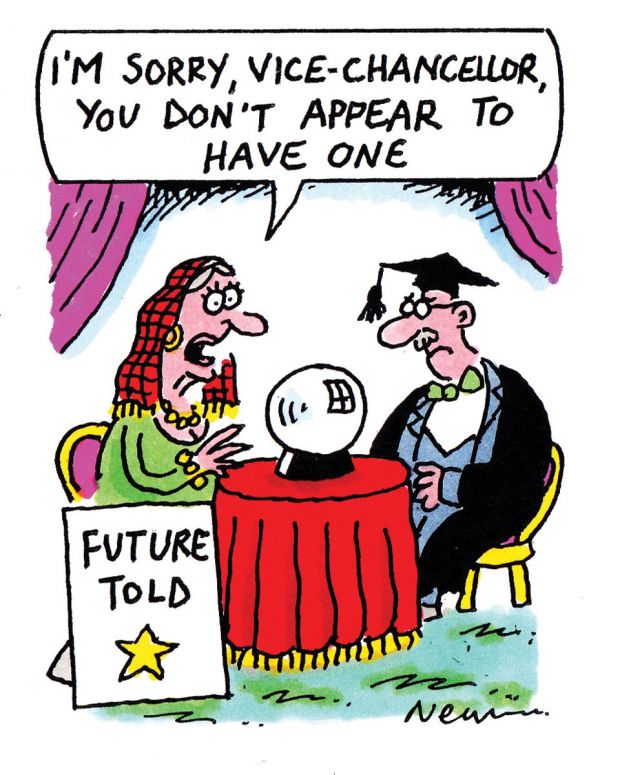
- Many vice-chancellors may be looking forward to 2015 with some trepidation given the trouble there was at the top in 2014. The news of exits began in March, when Chris Higgins said he would be leaving Durham University later in the year, an announcement made soon after its senate narrowly rejected a plan to trim his powers. In July, Plymouth University said that its vice-chancellor, Wendy Purcell, had been “placed on leave” (she had, in fact, been suspended) for undisclosed reasons. The chair of governors who suspended her later resigned after allegations emerged that he sexually harassed female staff and students, claims he denies. After another bizarre interlude focusing on the university’s spending £95,000 on seven handcrafted ceremonial chairs, Professor Purcell returned as vice-chancellor in November, but not to run the institution. Plymouth has refused to discuss the findings of the investigation into her conduct, the nature of its settlement with her or the findings of the inquiry into the sexual harassment allegations. With that situation “resolved”, it wasn’t long before we got news about another vice-chancellor’s future. The University of Salford announced on 9 December that Martin Hall would retire in summer 2015. In a salient detail mysteriously relegated to the last paragraph of the university’s press release, his departure began taking effect that very day.
- Plymouth was certainly a front-runner for the accolade for worst handling of a damaging and long-running self-inflicted dispute with an employee, but the University of Warwick was making a strong play. Thomas Docherty, a professor of English and comparative literature and a prominent critic of marketisation in the sector, was suspended by Warwick in January and charged with undermining the authority of his former head of department. The charge sheet detailed such heinous acts as sighing, projecting negative body language and making “ironic” comments while interviewing job candidates. But in October, a university tribunal cleared him of all charges, whereupon the case was picked up by the national media. If Warwick has a campaign to win itself some positive publicity, it’s in need of refinement: in December, West Midlands police used CS spray against people on a campus protest, and the university was accused of treating academics like City traders after using research-income metrics to select candidates for redundancy.
- Universities’ anger over student visa policies was unceasing. Theresa May, the home secretary, rounded the year off magnificently on 21 December, when The Sunday Times reported that she wants the next Tory manifesto to include plans to send all overseas students back home once they finish their courses – and to make universities responsible for ensuring that they do go. “Come to the UK: graduate, and then get the hell out!” ran the Bangalore Mirror headline on the plans, which was probably just how Ms May outlined the policy when she drafted it on a table napkin. Nevertheless, it could work: universities dish out degree certificates to overseas students on graduation day – why not make them double-sided and print deportation notices on the back?
- Journalists are sometimes criticised for not reporting on “good news”. December’s research excellence framework results, perhaps the biggest higher education event of the year, provided plenty of that – if you believe university press releases. De Montfort University proudly stated it was “fourth highest in the East Midlands for its research quality” – which brings to mind Flight of the Conchords’ claim to be “New Zealand’s fourth most popular guitar-based digi-bongo acapella-rap-funk-comedy folk duo”. Cardiff University said its “meteoric rise” in the REF meant it had “broken into the ‘Golden Triangle’ of Oxford, Cambridge and London” – which raises some questions from geographic, trigonometric and, perhaps, factual perspectives. The University of Ulster roared that it was “top in Northern Ireland for research into biomedical sciences, law, business and management, architecture and built environment, art and design, social policy, sport, media studies and nursing”. Sounds impressive – but less so when you recall that Queen’s University Belfast is the only other university in Northern Ireland, so it must have been top in everything else. When it comes to making a PR push on selective readings of data, the UK’s universities are definitely 4*.
Register to continue
Why register?
- Registration is free and only takes a moment
- Once registered, you can read 3 articles a month
- Sign up for our newsletter
Subscribe
Or subscribe for unlimited access to:
- Unlimited access to news, views, insights & reviews
- Digital editions
- Digital access to THE’s university and college rankings analysis
Already registered or a current subscriber?
Please or to read this article.
